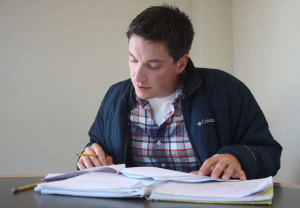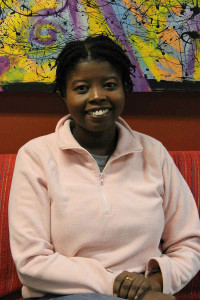For veterans, adjusting to college life can be a difficult transition
The adjustment from military life and culture to the radically different college environment can be a difficult one for United States military veterans, especially for ones who have served in combat.
Responding to the increasing number of veterans accessing higher education, Johnson State College will be creating a new course about veteran’s issues, David Bergh, JSC’s dean of students, said. The course will be not be limited to veterans only, but to anyone interested. Through the Vermont Community Foundation, he’s received grant money that will help fund the establishment of this class, training for faculty, and outreach programming for the next two years.
“Part of our mission is to be a resource for the community,” he said. “This is experimental; to find out what services will get a good response and what services are needed.”
This is the latest step in an attempt to provide a welcoming atmosphere for military-connected students. Earlier this year JSC opened the women’s center on Fridays from 10 a.m. – 2:00 p.m. as a veteran’s center for people at the school and in the local area. On Oct.15, during the monthly faculty assembly, JSC faculty learn more about the needs and challenges vets present in the classroom, the discussion led by Chara Vincelette, CCV’s veteran’s services resource and outreach advisor in St. Albans.
“I tell people that in many ways student veterans are no different than anyone else,” Vincelette said. “On a cross-section they are all completely diverse although there are some general trends.”
She referred to a study from the American Psychology Association, which examines a national cross-section of college students and that veterans “were twice more likely than their non-military counterparts to have thoughts about suicide, have depression or anxiety, or drop out of school.”
Isolated

(photo by Victoria Greenia)
As part of her work with CCV and JSC, Vincelette’s on a mission to help CCV and JSC create an environment that will help veterans excel in school. Drop-out rates are often due to the vet student feeling isolated and unsupported by faculty and classmates, she said. She, herself, is a military member who has served in Afghanistan and is intimately aware of the challenges. One incident in particular stands out in her mind.
She had just got out of work from the Army National Guard and was in uniform, walking across the central area of the college campus she was attending. As she passed a group of fellow students, they actually threw scrambled eggs at her and “called out every cliché you can think of – ‘baby-killer’ and ‘make love, not war.’”
The college she was attending was Johnson State College and it was the late ‘90s.
Thomas Sumner, 28, is a JSC senior pursuing a degree in history and education. He is a good-looking young man with dark hair and blue eyes. His clothes are stylish, clean, his manner is easy going, and he’s quick with a smile to put a person at ease. He’s not a person one would look at and identify as former military.
He prefers it this way.
“I don’t usually say anything to people about being a former Marine because I’m not sure how I will be perceived,” he wrote in a personal communication. “Many get their impressions from Hollywood movies and television. The war in Iraq is still a sensitive issue and I don’t want people to judge me based on what they’ve seen on T.V.”
Sumner served twice in Fallujah in his four-year service. When he finished his contract in 2008 he waited two years before he went to college. In this time he became accustomed to civilian life. Going directly from the extreme Marine infantry life to student life, he said, would have been difficult. He took his time, went to vet centers, and wrote about his experiences. Vet centers didn’t work well for him. The writing, he said, is probably what helped the most.
So when it came to college life, he said he felt prepared and had a “wonderful transition.” He also said he’s self-conscious of how people react to his military history and doesn’t talk much about it. One time, he said, there was a classmate he’d gotten to know for a while before he told her he’d been a Marine. Her response was, “Oh my God, you don’t seem insane at all!”
Wondering how classmates will react to the fact they are or were in the military has made some student veterans keep quiet, thereby creating a bigger wall.
“For a college to be successful in reaching out to veterans,” Vincelette said, “faculty, staff, and other students need to be educated about what a vet goes through.”
She said not to ask vets personal questions like, “Did you kill anyone?” or “Did anyone you know get killed?” or even “Do you think we should be over there?” Those are invasive and could make a person very uncomfortable. What people need to understand, she said, is how even just going through basic training can change the way a person thinks.
Student veterans, used to a defined hierarchy, can become frustrated with perceived disrespect from fellow students and with their teachers.
Military Mindset
“The difference between military life and student life is 180 degrees,” she said. “In the military it’s ‘I’m going to tell you what to do and how to do it.’”
Sumner said that the discussion atmosphere in an academic setting can be frustrating to a person used to being told what to do.
He said he knows vets who have had an issue with calling a professor by his or her first name and not having that clear distinction of power.
“You can’t be successful in the military being a freethinker,” he said.
Another potential issue for student veterans is politically-charged discussions.
Vincelette said she tells faculty that when discussing politics, personal bias should be out of the picture.
“College is an academic setting and there needs to be academic discussions on politics,” she said. “There’s no question of that. But it should be framed in a respectful way for the students to feel comfortable.”
Sumner said he’s felt distressed during these conversations in the class.
“Sometimes a professor will criticize the war and you just sink into your chair,” he said. “I often feel that if people knew I had been in the military they would think of me as part of the problem.”
The military trains people to stay alive, no matter what situation they may be in.
Training doesn’t just switch off when service-members are at school; situations and people are constantly being analyzed for threats.
Loud noises can cause an adrenal rush, Sumner said. When he’s in a room or building, he’s aware of the all the exits.
Vincelette said sometimes even something as simple as the classroom door being shut can be difficult for students who have been trained to always have an escape route.
Invisible Challenges
Training alone can imprint on a person’s mind, but if that person has had traumatic experiences there’s also a chance he or she could have what Vincelette termed “invisible wounds of war.”
She said it covers things like traumatic brain injury, post traumatic stress disorder, depression, and thoughts of suicide.
“I want to emphasize that this does not occur with every veteran,” she said.
Things that suggest that not all is well with a veteran student are outbursts, frequent absences, and being argumentative in classes.
The Positive
On the plus side, student veterans are hard-working and helpful. In discussions of global issues, their views can be eye-opening and with intense depth because of personal experiences, Vincelette said. They often excel in subjects like political-science or public policy.
“They have a broad world-view to bring into discussions,” she said. “The maturity level is outstanding. In general terms, a 20-year-old veteran is likely to have a wealth of experience compared to the 20-year-old non-veteran.”
Solutions
One of the most difficult aspects of the whole situation is how to help someone who refuses help, or doesn’t believe he needs help.
Vincelette said a teacher could help the student by speaking privately after class and having an honest discussion. “Tell them that you care and you want them to succeed,” she said. “Be supportive, but also set boundaries; if they miss more classes they may fail or be kicked out. Also, give the students local resources for the help they need. Teachers don’t need to be counselors, and they should not pry into private information.”
One resource JSC teachers now have at their fingertips is referring them to a veteran’s counselor right on campus.
Marie Milord is a supervisor from the South Burlington vet center with a counseling license. For four hours every Friday, she turns the room across the hall from public safety in Dewey Hall into a vet center. Although she’s been there since March, there hasn’t been a lot of response.
“There have been a few people who’ve come here,” she said. “People know about me here but are skeptical to come in.”

(Photo by Kayla Friedrich)
Milord said although she does offer counseling for dealing with stress and working on communication issues, she can also help veterans fill out confusing government paperwork for benefits like the GI Bill or VA loans.
There’s a stigma about seeking help, she said, and in a small town people don’t want other people to know they are coming for counseling.
As dean of students, Bergh isn’t bothered by the fact the visitor count has been low.
“What I’ve heard time and time again from other colleges is to be prepared to take a long time for the community to take advantage of it,” he said. “We want to be a resource for local veterans and we want feedback on what they need.”
One of the easiest ways for people to help, Milord said, is to educate themselves on the issues veterans face in adjusting to an academic setting and not rely on the stereotypes to form their opinions.
“Because we hear so much about PTSD we think every veteran is crazy and can’t fit into society,” she said. “Some veterans do need help but a lot are able to function perfectly on their own.”


